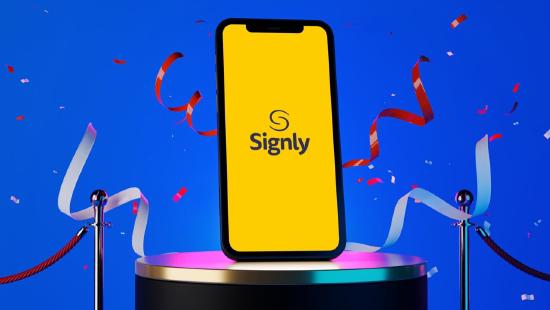Revolutionary new app unlocks cultural venues for d/Deaf people
Signly, an app created for d/Deaf British Sign Language users in collaboration with the Roald Dahl Museum and Story Centre, has won the prestigious Jodi Award 2017. Winners were chosen from a shortlist of museums, galleries, archives, libraries and heritage sites that make best use of technology to widen access for disabled people and those with sensory impairment. The presentations were made at a special ceremony held at the Attenborough Arts Centre of Leicester University on Thursday 27 June 2017. Judges were impressed by the strong testimonials and feedback from users of the Signly App and its value as an innovative tool in enhancing the experience for d/Deaf visitors to the Museum.
Steve Gardam, Director of the Roald Dahl Museum, was delighted to hear of the recognition Signly has received from the Jodi Mattes Trust.
“The Roald Dahl Museum and Story Centre is proud to have been the first public venue to use Signly, and an investor in developing the app. Roald Dahl loved inventiveness and Signly is a great way for a small museum like ours, in a complex set of old buildings, to inventively increase accessibility using the technology visitors bring in their own pockets.”
- Steve Gardam, Director, The Roald Dahl Museum and Story Centre

Signly is an app which displays pre-recorded sign language videos on a user’s mobile, enabling better access to visual content for d/Deaf sign language users. The app is downloaded from the App Store or Google Play and when opened can be pointed at labels throughout the Museum to display British Sign Language videos. This enables visitors to access information about the exhibits without having to make known ‘a special need’ or to wait for interpreted tours.
Co-founder of Signly, Mark Applin explains how the app became a reality:
“The team at the Roald Dahl Museum showed a real pioneer spirit adopting Signly. Their forward–thinking approach and the passion of our co-founders at Deafax combined to make Signly a reality, not a concept. They rightly received plaudits from the d/Deaf community and kick-started Signly so we could reach other sectors. We’re so grateful.”
Being earmarked for this prestigious award means Signly can now reach deeper into the lives of the d/Deaf community where its benefits are starting to be felt in other sectors such as finance, safety, health and the Arts.
Notes for Editors
Signly is an app which displays pre-recorded sign language videos on a user’s mobile, enabling better access to visual content for d/Deaf sign language users. Signly is ideal for museums, galleries, theatres, leisure centres, libraries, information centres, bus and rail stations, airports… any organisation looking to meet its obligations under the Equality Act 2010. Quickly translating key messages into filmed sign language for the app, content is triggered at key locations on the visitor route simply by holding up a smart device against a Signly ‘marker’ or object.
For further information or to arrange a visit to the Roald Dahl Museum to see Signly in action, please contact Mark Applin mark@signly.co 07870 591332.
The Roald Dahl Museum and Story Centre is aimed at 6 to12 year olds and their families and is situated in the village of Great Missenden, where Roald Dahl lived and wrote for 36 years. It has three fun and fact-packed interactive galleries. Visitors can see the original interior of his Writing Hut, the ramshackle but magical place where he crafted all his children’s stories.
For further information about the Museum, please contact Isabelle Reynolds isabelle@roalddahlmuseum.org 01494 892192
Established in 1985, Deafax develops solutions and opportunities for deaf people, to empower them and enhance their lives. Deafax is the number one organisation for specialist visual and interactive deaf-friendly resources.
Our training and resources cover a wide range of different topics in the fields of health, employment, education and life skills and our visual, interactive, specialist approach is consistent throughout.
In visitor attractions and other locations, we know that written English is not always the best way to share information with deaf people, as many of them prefer sign language. Signly is therefore a major step forward in providing equal access for more people.
For more information about Deafax’s work, please email Helen.

